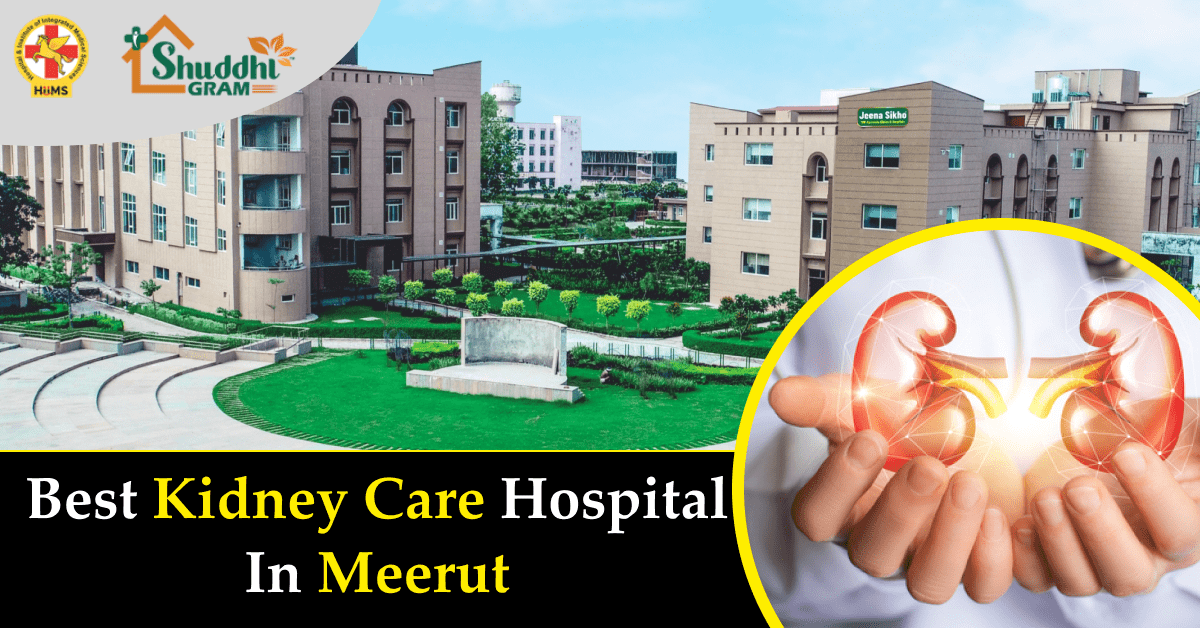
A Silent Battle, A Miraculous Turn
I recently met one of my very old friends and noticed something unusual in him. He had always been active and health-conscious, but suddenly, something changed his way of life. He was constantly fatigued, his feet swollen, and he had difficulty sleeping. After seeing a doctor out of concern, he was told that he had a chronic kidney disease, which destroyed his way of life. The doctors informed him that his kidneys were failing and that dialysis was necessary. The thought of relying on machines for survival broke him. He was searching for an option that may heal him without requiring dialysis and for him to spend his life in hospitals and undergoing costly therapies. With the help of some YouTube videos and live podcasts of people who had the same problem, they opted for the natural therapies at HiiMS, gradually making them fit and fine. That’s when he discovered HiiMS, one of the best kidney care hospitals in Meerut for its holistic treatment of kidney disease. We decided to take him to HiiMS, which was our best decision.
When Hope Seems Lost, Ayurveda Shows the Way
Conventional medicine offers only one solution: dialysis or transplant. But my friend preferred something different. He’d heard about kidney treatment without dialysis from HiiMS, so he decided to try Ayurveda after hearing the success stories of other patients.
HiiMS, a well-known kidney specialist hospital, has achieved distinction in treating chronic kidney illnesses using natural and noninvasive approaches. Based in Derabassi, Chandigarh, HiiMS Shuddhigram provides complete Ayurvedic treatment focusing on long-term healing rather than symptom management.
Understanding Kidney Disease: More Than Just a Diagnosis
The kidneys are the most important part of the body because they filter toxins from the blood and regulate blood pressure. When kidney function decreases, the waste accumulates in the body and causes severe side effects. Common causes of kidney disease are:
- Excessive pharmaceutical use: Long-term uses of pain relievers and antibiotics might harm renal tissues.
- Unhealthy lifestyle habits, such as poor food, dehydration, and a lack of exercise, all contribute to renal failure.
- Autoimmune illnesses, such as lupus, can impair kidney function.
- Genetic considerations – Some people have kidney diseases.
Symptoms That Should Not Be Ignored
My friend had ignored these symptoms for too long, believing they were simply signs of stress. The signs of kidney failure are sometimes confused for general fatigue. Some frequent markers are:
- Swelling in the legs, ankles, and eyes.
- Chronic tiredness and weakness.
- Urine pattern changes: excessive or insufficient urination.
- Loss of appetite, nausea, and vomiting.
- Concentration issues and sleep disturbances.
When most patients notice these symptoms, their kidney condition has already advanced. At HiiMS, the method is not limited to diagnosing and treating the disease; it also includes naturally reversing it.
HiiMS: A Revolutionary Approach to Kidney Healing
My friend was introduced to HiiMS’s one-of-a-kind healing procedure, which integrated traditional Ayurvedic wisdom with modern naturopathic approaches. Their treatments address the root cause of kidney illness rather than simply suppressing symptoms.
1. Panchakarma Therapy – Detoxifying the Body
This ancient Ayurvedic treatment helped remove accumulated toxins from his body, improving kidney function and overall vitality.
2. The GRAD System – Enhancing Circulation
HiiMS Shuddhigram uses innovative gravity-based therapies like Head Down Tilt and Hot Water Immersion Therapy, which boost blood circulation and kidney efficiency.
- Head-Down Tilt (HDT) Therapy: Boosting Blood Flow
Head-down Down Tilt therapy may help improve circulation to the upper body at 5°-15°angle tilt, as per the issue. It’s generally recommended for kidney issues as it will increase pressure in the renal system. It is essential to monitor any posture-related therapy closely, especially for individuals with kidney disease.
What It Does:
- Boosts blood flow from the feet to the kidneys, helping the remaining healthy nephrons filter waste.
- Balances hormones that control blood pressure and fluid retention.
- Reduces fluid buildup in the body and supports tissue repair.
- Hot Water Immersion (HWI) Therapy: Detox in a Tub
Hot water immersion therapy can improve blood circulation, which may help support the kidneys by enhancing the flow of oxygen and nutrients, for which a 42℃ water temperature is needed for at least 30 minutes.
What It Does:
- Dilates blood vessels, increasing kidney blood flow.
- It induces sweating to remove toxins and reduce kidney stress.
- It relieves muscle cramps and promotes relaxation.
- It helps reduce stress levels, a significant factor in kidney health.
- The DIP Diet: Heal from the Inside Out
The DIP Diet is the nutritional backbone of the GRAD System. It focuses on whole, plant-based foods that reduce kidney stress and promote healing.
Breakfast (7 am – 9 am)
- Body Weight x 10g of seasonal fruits (3 to 5 types) + homemade millet.
- Provides energy, fibre, and natural sugars for body cleansing.
Lunch (1 pm – 2 pm)
- Body Weight x 5g of salad (3 to 5 types) + home-cooked millets.
- A nutritious, low-calorie meal that fills you up without excess calories.
Dinner (Before Sunset)
- Body Weight x 10g of seasonal fruits & salad (3 to 5 types) (if not having dinner)
- Body Weight x 5g of seasonal fruits & salad (3 to 5 types) + vegetable soup (if having dinner)
- Light and early dinner support digestion, metabolism, and peaceful sleep.
Why It Works:
- Plant-based foods are light and kidney-friendly.
- Minimises salt, oil, and animal protein, reducing kidney burden.
- It is packed with nutrients and antioxidants that energise and heal the body.
5. Herbal Remedies – Nature’s Healing Touch
Ayurvedic herbs, such as Punarnava, Gokshura, and Varun, were given to him to strengthen his kidneys, increase his urine output, and minimise his oedema.
A Transformation Beyond Expectations
After a few months of implementing HiiMS’ treatment protocol, my friend observed a significant improvement. His creatinine levels decreased, and his energy levels recovered. He avoided dialysis and opt kidney care without dialysis. Today, he is a living example of the power of Ayurveda. HiiMS Shuddhigramis more than just a kidney specialist hospital. It’s a place of transformation, hope, and genuine healing.
Why does HiiMS Shuddhigram stand out as the Best Kidney Care Hospital in India?
- Holistic healing with no side effects.
- Non-invasive treatments aimed at long-term recovery.
- Ayurvedic remedies are blended with current naturopathy.
- Individualised treatment programs for each patient.
- An affordable and effective alternative to dialysis and transplantation.
Conclusion
If you or a loved one has renal disease and is looking for an alternative to dialysis, HiiMS Shuddhigram provides a ray of hope. Thanks to its integrated approach, which is supported by Jeena Sikho Lifecare’s expertise, thousands of people’s lives have been altered. My friend decided to heal organically, trust Ayurveda, and regain his life. He lives fearlessly, without dialysis, and with a fresh sense of vitality. If you need help, call us at 82704-82704 or care@jeenasikho.com – we’re here to help!







No approved comments yet.